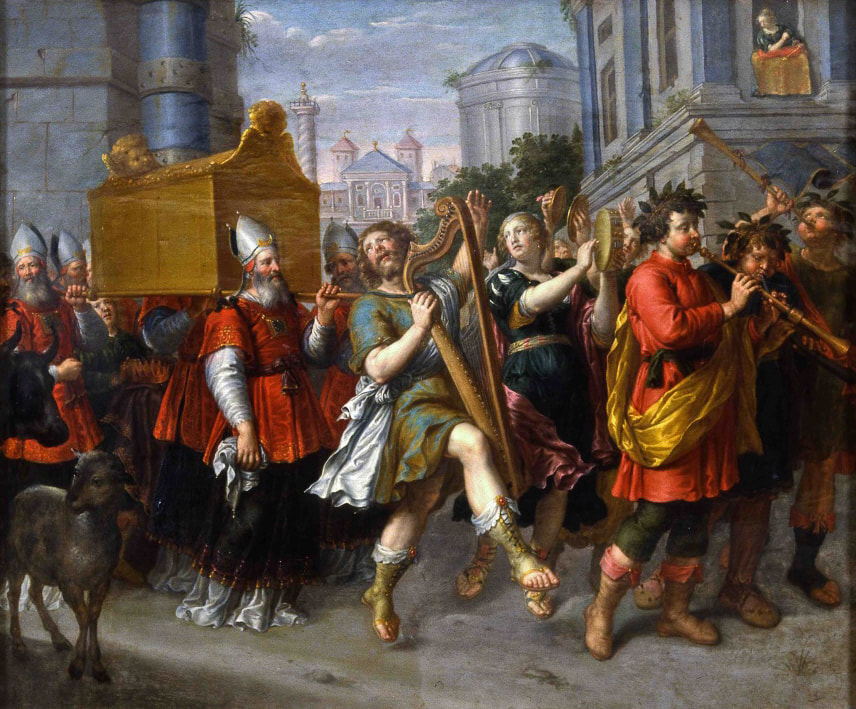Psalm 89
2 Samuel 6: 12-19
Hebrews 1: 5-14
Reflect:
Psalm 89 was not easy for me to follow. If you feel the same way, it may help to remember that there may have been as many as three different psalmists contributing to its writing over a span of many years.
The first part of the psalm was probably written by Ethan the Ezrahite, one of David’s singers. The first several verses tell us how great God is. We hear the praises of God sung by Ethan: ‘I will sing the mercies of the Lord forever. I have made a covenant with my chosen, and I will tell my children and my grandchildren that You will do as You have promised.’ God made a very significant promise: that someone of David’s lineage will always be King. Then Ethan sings about God’s power: ‘He calms the seas and tides; He obliterates his enemies. Strength is your hand, mighty is your right hand’ (Jesus, of course, who sits at the right hand of God the Father). God anoints David, who says to him, ‘Thou art my father, my rock and the rock of my salvation’. And God promises that David’s seed will endure forever.
I didn’t know what the word ‘selah’ meant before I researched this psalm. Do you know? It means when you encounter a situation of uncertain meaning, rest, stop for a minute and pray, or listen to music. It’s a good idea to do exactly that whenever the tone of Psalm 89 changes abruptly, as it does around verse 30. God says if the children of David forsake his law and walk not in his judgments, or break his commandments or cast his crown down to the earth, then they have set up the right hand of their enemies who rejoice in their defeat.
The psalmist asks, ‘How long, Lord, wilt Thou hide thyself forever?’ He reminds God that his own time upon earth is short and asks, ‘Where are the former loving kindnesses which thou swearest unto David in thy truth?’.
In verse 33, God emphasizes that He will not withhold His loving kindnesses from David’s people, nor suffer His faithfulness to fail them. The psalm ends with these words: ‘Blessed be the Lord for evermore.
Amen and Amen.’
In the reading from Second Samuel, David brings the ark into Jerusalem with gladness, and sets it in the middle of the tabernacle that he had pitched for it. And ‘David danced before the Lord with all his might’. He then gave offerings and blessed the people in the name of the Lord. Food and drink were given to all. But Michal, daughter of Saul, reproved David for dancing and showing himself before the Lord. David’s reply: that God had appointed him ruler of the people of the Lord, so he would play before the Lord.
The dominant tone here is one of celebration and joy. In moving the ark, David has taken over a city that was not part of any tribe. Jerusalem can literally be called ‘the city of David’. David is not a perfect human being: sometimes good, sometimes self-serving. In establishing the city of David, he shows political awareness and the power of manipulation which are often evident in strong leaders of nations.
The reading from Hebrews reminds us that in the beginning, God made the heavens and the earth, and they will erode, distort and disappear over time. But the Son of God will remain. He is the same. When God speaks through this Son, we are affected, we are changed. God actually brings about His purposes for us through this word, this Son. In and through His life and death, He purifies sin. Having accomplished this cleansing for us, He ascends back to the Father and sits at his right hand as the glorified incarnate Son.
Pray:
Practice ‘selah’ when you find yourself in a moment of confusion, despair or frustration. Go somewhere quiet. Meditate for a short while, try to completely clear your mind. Put your worries to one side and lay yourself open to God’s calmness. Know that He feels your concerns, and wants you to know and believe that He is with you always.
Barbara Bierman


 RSS Feed
RSS Feed